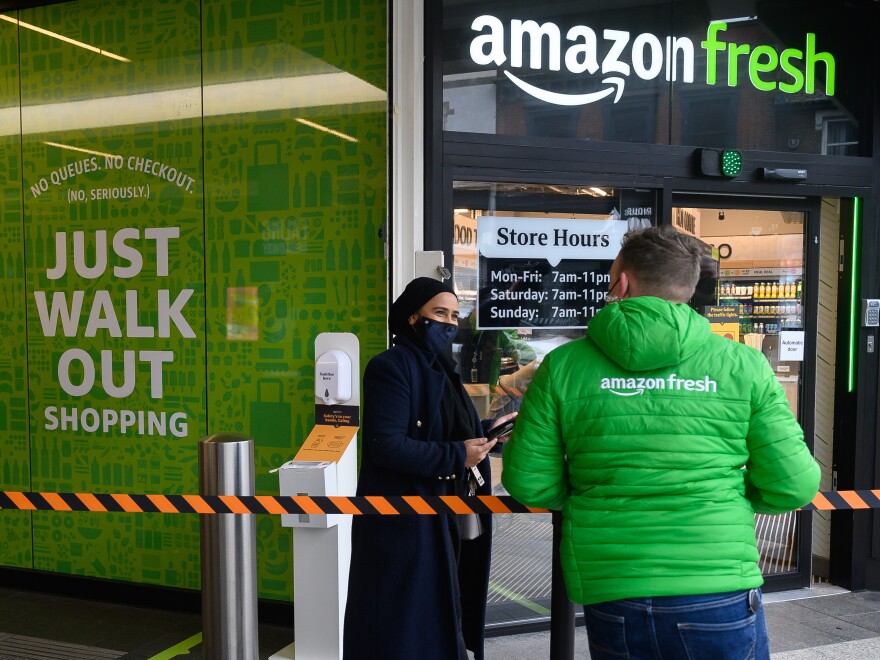This story is free to read because readers choose to support LAist. If you find value in independent local reporting, make a donation to power our newsroom today.
No More 'Just Walk Out' At Amazon Grocery Stores. The New Bet Is Smart Shopping Carts

As far as Amazon's gee-whiz technology goes, "Just Walk Out" is in the pantheon: Early shoppers marveled at the concept of grabbing stuff off grocery shelves and simply leaving, tracked by cameras that calculate the eventual receipt.
In California
Amazon Fresh has 18 locations in California, the majority in the L.A. area. Of those, nine already have the "dash cart" tech in place, including stores in Pasadena, Whittier, Irvine and Long Beach.
Amazon banked big on this to propel its sprouting grocery business past competitors — and in the process transform the industry.
Now, it's taking this tech out of its Amazon Fresh stores in the U.S. (It's staying in the UK.) Many experts wondered what took so long: The experiment clearly failed to spread widely. The "just walk out" revolution did not come to Amazon's own Whole Foods, let alone the industry.
That's a big admission of defeat, though certainly the company does not accept that term. The technology will still live on at Amazon Go convenience stores and dozens of other smaller shops at airports, arenas, amusement parks and hospitals.
But Amazon's cashier-free grocery ambitions are only shapeshifting, even as the retailer scales back its push to automate the entire supermarket experience. It's now betting that the smart shopping cart could still change how we shop for food.
"This is a failure; however, let's not forget that Amazon's success is built on failures," says Guru Hariharan, CEO of CommerceIQ and a former Amazon manager. "That's the ironic part of it."
Tech has yet to help Amazon win the grocery race
Grocery, a multibillion-dollar market that calls for physical stores, has long been the final frontier for Amazon.
The retailer entered the game late, opening Amazon Go minimarts in 2016, buying Whole Foods in 2017 and launching Amazon Fresh grocery stores in 2020. There are now more than 40 Fresh stores, and just over half use the "just walk out" technology.
The marvel did not draw crowds. Shoppers often said they felt weary passing through entry gates and being tracked by omnipresent cameras and sensors. Amazon says people also wanted to see the running tally of prices and discounts as they shopped — not later, after leaving.
The tech is also expensive and complex. Outfitting every nook and cranny of a large store with smart computer vision proved unreasonable. And it still required some human involvement, with people behind the scenes helping machines learn to interpret video and clarify uncertainties.
"The accuracy expectations from the consumer on this are unbelievably high," Hariharan says. "Is it 100% accurate, 100% of the time? If it's not, then it starts to lead to consumer trust issues."
Enter the smart shopping cart
The smart shopping cart gave Amazon a scaled-back tech solution.
In recent years, the company has been overhauling Amazon Fresh, laying off workers at the stores, closing some stores and revamping others. It's also changed its design of the smart Dash Cart, reeling in its tech complexity.
The cart is now essentially a self-checkout on wheels. Shoppers can hold up products to built-in scanners, a scale can weigh produce, a touch screen can show real-time updates to the receipt.
Amazon has rolled out the Dash Carts to a handful of Whole Foods stores, but has not said when or whether they'd become ubiquitous. The high-tech carts would face competition from several smaller companies offering smart carts.
Amazon potentially could sell its cashier-less carts to many retailers, including rival grocers. And Hariharan sees a big financial opportunity in marketing on the cart's screens, with advertising becoming one of Amazon's fastest-growing businesses.
All this, of course, depends on shoppers' learning curve with new technology, says Uttara Ananthakrishnan, who teaches about the digital transformation of the grocery industry at Carnegie Mellon University.
Lately, retailers have been reconsidering their approach to self-checkout because it's prone to thefts and mistakes by shoppers. Ananthakrishnan says grocery stores are a particularly hard place to introduce new tech.
"There is so much product variety. Not everything has a code. A lot of things need to be weighed," she says. "And then you kind of place the onus on the customers, and a lot of people don't like that."
Editor's note: Amazon is among NPR's financial supporters.
Copyright 2024 NPR. To see more, visit npr.org.







